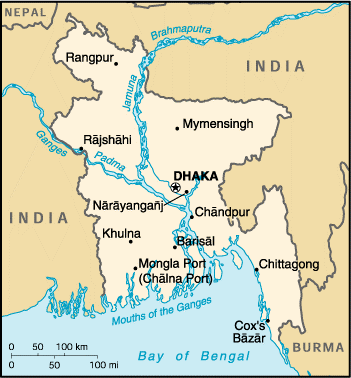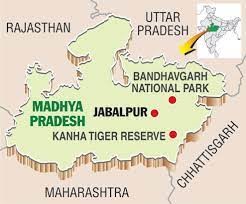1. Current Situation in Bangladesh
CONTEXT:
- Political Crisis: Prime Minister Sheikh Hasina has resigned amid mass protests and escalating violence.
- Internet Blackout: In response to the protests, the government has imposed an internet blackout, cutting off mobile and broadband services to curb the unrest.
- Border Security: India has stepped up its border security in response to the crisis, with top officials reviewing the operational preparedness of the Border Security Force (BSF) along the Bangladesh border
Historical Context of India-Bangladesh Relations
- Liberation War of 1971: India played a crucial role in Bangladesh’s independence from Pakistan. The 1971 war led to the creation of Bangladesh, and India was one of the first countries to recognize its sovereignty.
- Bilateral Cooperation: Over the years, India and Bangladesh have developed strong bilateral ties. Key areas of cooperation include defense, border management, and river water sharing.
- Economic Relations: Bangladesh is India’s largest trading partner in South Asia. Trade relations have been bolstered by agreements like the South Asian Free Trade Area (SAFTA), which provides duty-free access to Bangladeshi exports.
- Connectivity Projects: Several connectivity projects have been initiated to enhance trade and people-to-people contact, such as the Maitree Express train service and the restoration of old railway links.
Current Issues in India-Bangladesh Relations
- Border Management: Despite the Land Boundary Agreement of 2015, border management remains a challenge due to issues like illegal migration and smuggling.
- Water Sharing: The sharing of river waters, particularly the Teesta River, remains a contentious issue. Both countries are working towards a mutually agreeable solution.
- Rohingya Crisis: The influx of Rohingya refugees from Myanmar into Bangladesh has implications for regional security and humanitarian efforts. India has extended support to Bangladesh in managing this crisis.
2. What is Alderman : an issue pending with MCD Delhi
CONTEXT: The recent Supreme Court verdict addresses the appointment of aldermen to the Municipal Corporation of Delhi (MCD), a matter that has significant implications for governance and development in Delhi.
Supreme Court Judgement
- Verdict Details: The Supreme Court upheld the right of the Lieutenant-Governor (L-G) to appoint aldermen to the MCD. This ruling came despite objections from the AAP, which argued that this decision undermines the spirit of democracy by bypassing the elected government.
Role and Relevance of Aldermen
- Definition: Aldermen are members appointed to municipal bodies who are not elected but are nominated based on their expertise or experience in municipal administration.
- Constitutional and Legal Framework: The appointment of aldermen is provided for under the Delhi Municipal Corporation Act. The L-G has the authority to appoint up to 10 aldermen based on their special knowledge or experience. This is intended to bring in expertise that may not be represented through elected members alone.
- Constitutional Relevance: Aldermen have a specific role in the municipal governance structure. They are involved in the decision-making processes of the municipal corporation but do not have voting rights in the MCD House or the Standing Committee. Their primary function is to contribute their expertise to the governance of municipal affairs.
Implications of the Verdict
- Governance and Development:
- The appointment of aldermen aims to address gaps in municipal governance by incorporating expert knowledge. However, the delay in forming the Standing Committee has led to a backlog in development projects.
- The constitution of the Standing Committee, which has been pending for over a year and a half, is critical for approving significant projects and accelerating development work in Delhi.
- Administrative Impact:
- With the Supreme Court’s decision upholding the L-G’s authority, there may be a push towards resolving the current administrative stalemate. This includes expediting the election of members to the Standing Committee and addressing stalled development projects.
3. India and Africa’s Partnership in Food Security
Context and Importance
- Conference Overview: India is hosting the 32nd International Conference of Agricultural Economists (ICAE) from August 2-7, 2024, in Delhi.
- This conference, which has historical roots in India, gathers experts to discuss global food and nutritional security.
- Historical Context: The ICAE was first hosted in India in 1958 with Jawaharlal Nehru as the chief guest.
- The conference’s origins are linked to the efforts of Rabindranath Tagore and Lord L.K. Elmhirst to address rural development challenges in India.
Key Findings from the ICAE Study
1. Financial Constraints and Agricultural Spending:
| o High debt service ratios in some regions lead to reduced agricultural spending compared to social protection needs. o African countries typically underfund agriculture relative to Indian states, impacting productivity and efforts to combat child malnutrition.
|
2. Investment in Agricultural R&D and Extension | o Both regions underinvest in agricultural research and development (R&D) and extension services.
o Increasing public spending in these areas is crucial for enhancing agricultural growth and improving nutritional outcomes.
|
3. Need for Subsidy Reform:
| o Reforming subsidies and reallocating resources to infrastructure and R&D could significantly boost agricultural growth and child nutrition.
|
4. Impact of Agricultural Investment:
| o Proper investment in agriculture contributes to poverty reduction and minimizes the need for social spending.
o While food aid is necessary during crises, it should not replace long-term growth strategies.
|
Global Food Security Challenges
- Current Status: Global efforts to end hunger face significant hurdles due to conflicts, climate change, and economic slowdowns. The goal of zero hunger by 2030 is increasingly challenging to achieve.
- Investment Needs: A study from the University of Bonn and FAO indicates that an additional annual investment of $21 billion in agriculture and rural areas is required to end global hunger by 2040.
Role of G20 and South-South Collaboration
- India’s Leadership: India’s G20 presidency has focused on food security and introduced a bioeconomy strategy. Facilitating the African Union’s inclusion in the G20 platform emphasizes the need for South-South collaboration.
- Future Prospects: The G20’s leadership sequence (Indonesia, India, Brazil, and South Africa) suggests evolving governance in global food systems. Developed countries can support the Global South through climate resilience efforts and sharing scientific innovations.
- Bio economy and Climate Resilience:
- Building a robust bio economy and investing in climate resilience are critical for addressing food security challenges.
- Global investments, including those from the Global Climate Fund, can support these efforts.
Action Points and Recommendations
- Strengthen South-South Collaboration:
- India and Africa should leverage their shared experiences to enhance agricultural practices and address nutritional challenges collectively.
- Increase Investment in Agricultural R&D:
- Both regions need to boost public spending on agricultural research and extension to drive productivity and innovation.
- Reform Subsidies:
- Review and reform agricultural subsidies to redirect resources towards infrastructure development and R&D.
- Focus on Climate Resilience:
- Support initiatives that build resilience against climate change to protect agricultural productivity and food security.
- Leverage G20 Platform:
- Utilize the G20 platform to drive global action on food security and nutritional challenges, promoting collaboration between developed and developing nations.
4. Bandhavgarh National Park
CONTEXT: 34 Tiger deaths in Bandhavgarh National Park
Key Facts
Historical Significance
Flora and Fauna
Conservation Efforts
|




